New Zealand’s international student enrolments are bouncing back amid strong public support for internationalisation. The recovery is taking longer than in other major destinations because New Zealand’s borders were closed during the COVID-19 pandemic for much longer than in most countries, only opening again in mid-2022.
Enrolments up 67% over 2022
A new analysis provided by data specialists Studymove finds that close to 70,000 international students were enrolled in New Zealand’s education system in 2023 according to the Ministry of Education. This represents a 67% increase over 2022, and the growth was mainly driven by university-level students. Universities recovered 86% of their pre-pandemic enrolments compared to an all-sector average of 60%.
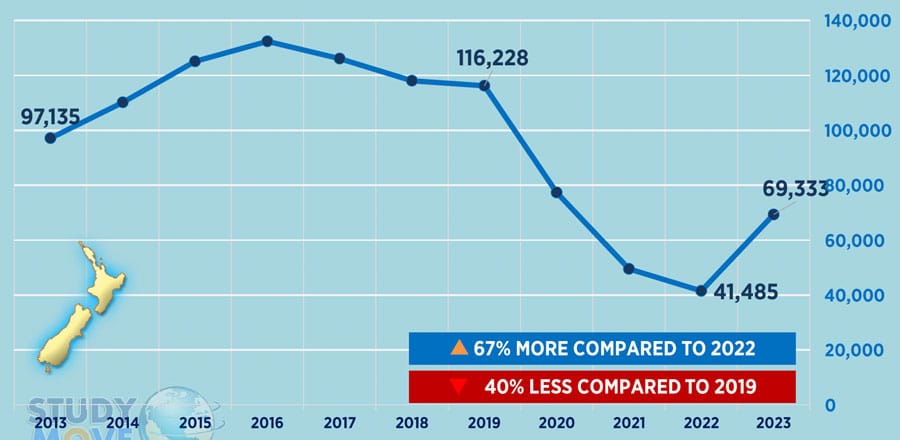
Uneven recovery
While the university sector had a strong 2023, recovery in other sectors was weaker: schools reached 60% of 2019 international enrolments and private training establishments (PTEs) and Te Pukenga got to 58% and 52%, respectively. The English-language sector struggled the most to recover enrolments (33% of 2019 numbers).
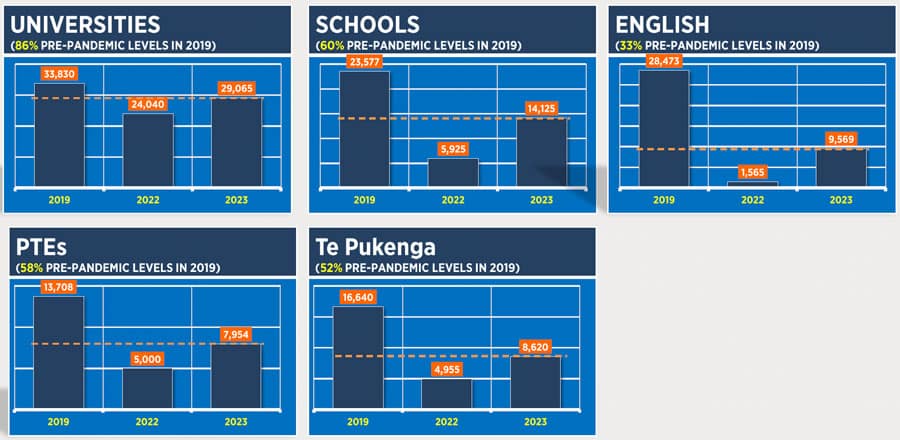
Source markets
On average across all sectors, China (64% of 2019 enrolments) contributed more to a rebound than India (46%). The number of Indian students dropped from about 17,300 in 2019 to 7,930. Another important market, Brazil, fell out of the top 10 in 2023. Brazil is mainly a vocational market for New Zealand.
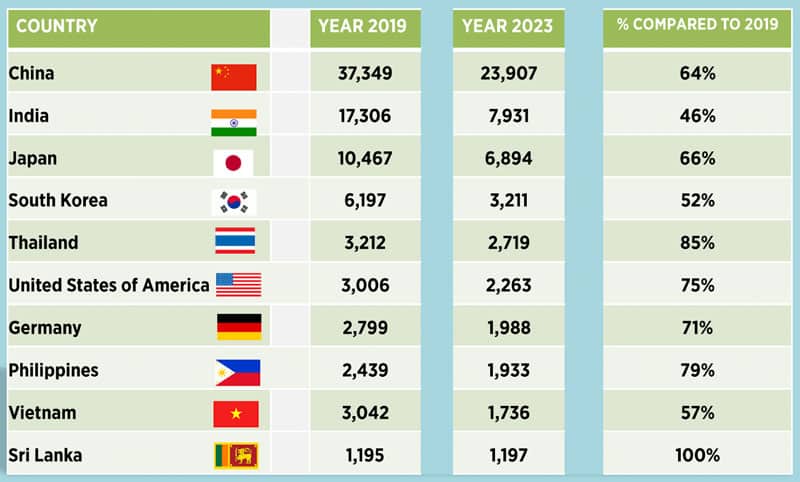
However, India came back stronger for New Zealand’s universities, and 2023 enrolments from some other top ten markets were higher than in 2019, as shown in the chart below. Chinese enrolments in universities were close to pre-pandemic levels in 2023.
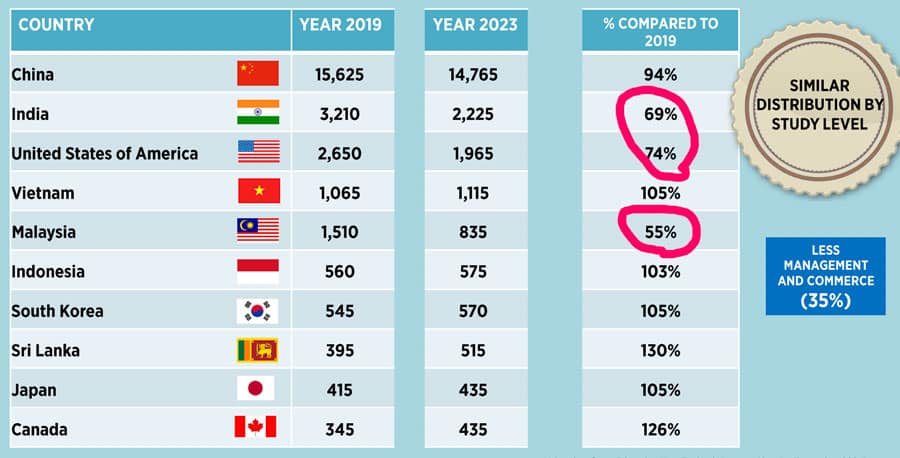
Visa trends
In 2023, almost twice as many visas for first-time, full-fee students were approved as in 2022. The estimate for 2024 is 24,000 visas approved, which is not far off the pre-pandemic volume.
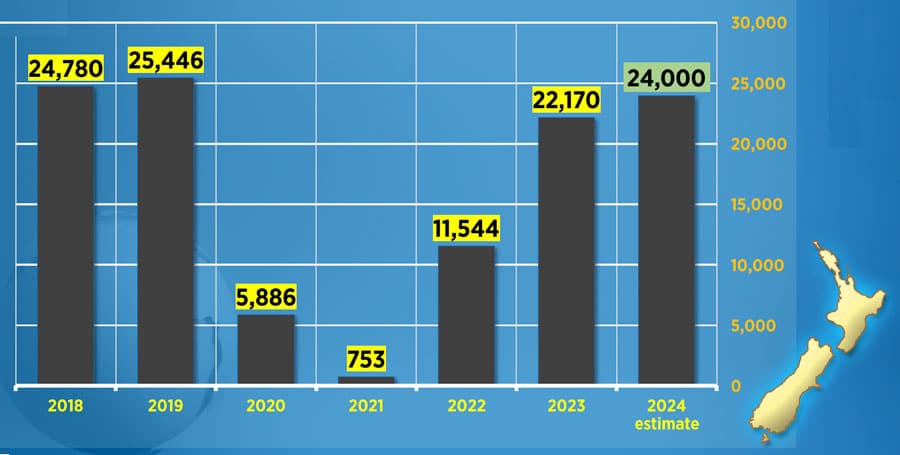
Strong public support for internationalisation
More than three-quarters of New Zealanders surveyed in 2024 by Education New Zealand Manapou ki te Ao (ENZ) support maintaining (36%) or increasing (41%) the number of students coming into the country for studies.
Commenting on the findings, ENZ’s Chief Executive, Amanda Malu, said:
“Since 2018 we have seen increasing support for the contribution international students make in key areas. Today 82 percent of New Zealanders agree that international students contribute to our cultural diversity, with 79 percent feeling they help local students learn about other cultures and ways of life, as well as contributing to local businesses during their studies.
This level of support is enormously pleasing. It tells us we can continue to steadily grow the number of international students in New Zealand and that they will continue to receive a warm welcome in our communities.”
The importance of social licence and data
The ENZ survey results are interesting to consider because of trends in Australia, Canada, and the UK, where (1) support for immigration is declining, (2) people aren’t always clear about what kind of immigration they are opposed to, and (3) governments are set on reducing the number of international students.
For example, in the UK, September 2024 Ipsos tracking research found that 55% of Britons want to see immigration reduced, up from 42% in 2022. The research revealed as well that Britons believe that asylum seekers represent more than a third of total immigration (37%) when the proportion is in fact 7%, that workers account for 26% when they actually compose 40%, and that international students make up 19% when the true percentage is 38%. When they were asked about different types of immigrants (e.g., nurses, doctors, engineers, fruit pickers), less than 30% wanted to see reductions.
The Ipsos findings underline the importance of breaking out international students from net migration statistics. Specifically, two things can be true at the same time: people may want to see immigration levels reduced while also appreciating the value of international students. For example, the Public Policy Institute at King’s College London conducted a survey in May 2024 that found that:
- A majority (58%) of Britons want international student numbers to remain the same or increase.
- Fewer than 3 in 10 (29%) believe international students should be counted in immigration statistics, slightly less than in 2023 (32%).
- Only one migrant group – “refugees and asylum seekers” – was cited more in 2024 than in 2023 as a migrant category that should be counted in immigration statistics.
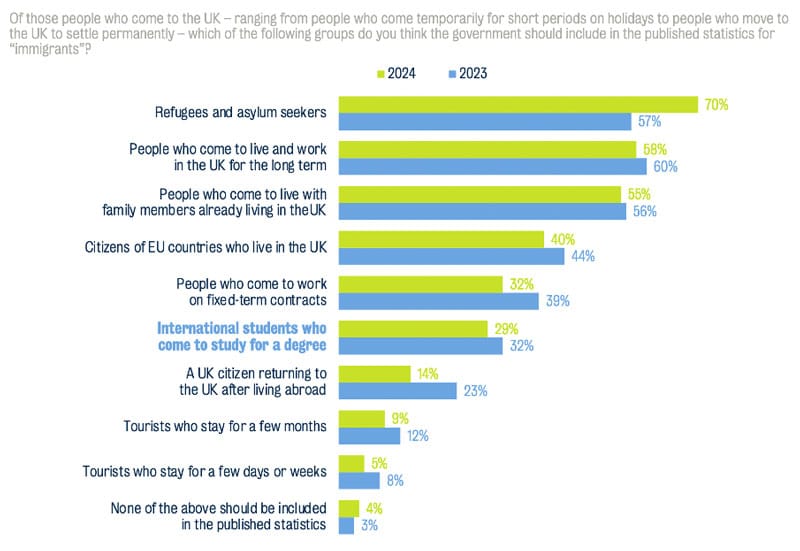
The Public Policy Institute research, as well as ENZ’s research about public support for international students, are examples of data-based initiatives whose findings can be used in discussions with and advocacy for all levels of government.
For additional background, please see:
Source